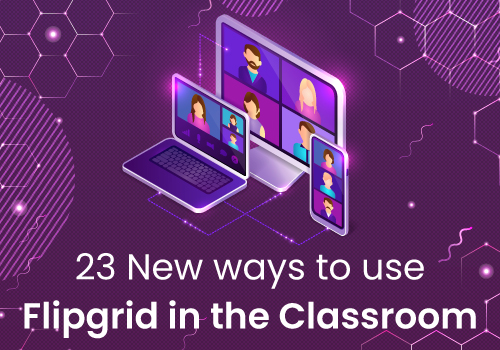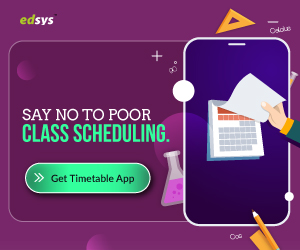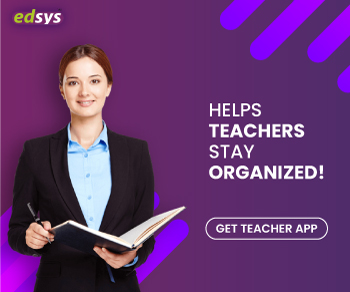What is Flipgrid?
Flipgrid is a social learning platform for students from kindergarten to Ph.D. and beyond…
It is a tool to record and share short and awesome videos. It can be used to engage and empower every voice in your home or classroom.
Educators create Grids and add topics; these grids are the meeting place for the classroom to discuss the topic. Here, learners can share their stories and ideas.
It is 100% free to use tool for educators, students and families.
| “Flipgrid brings the back row to the front.”- Charlie Miller
|
English Language Art Ideas
1. Debate about a Topic
Teachers can create a grid and assign a debate topic to students.
Students can start debating and share their ideas and comments here.
2. The Reading Response goes Digital
After teaching or discussing a particular topic in your class, engage students by asking questions based on it.
You can take the discussion further by having students comment on each other responses.
3. 30-Second Book Talk Challenge
Make your students speak on their favorite book in 30 seconds or less. This helps to improve their speaking skills.
4. Celebrate ‘The Global Read Aloud’ all year long
It is a reading fest, celebrated all over the globe which spans for 6 weeks from October to the middle of November. In this, all teachers read one book and connect with every other classroom in the world.
Using a platform like Flipgrid, teachers can connect with students and educators, every time you read a book.
5. Record an Ongoing Story
Students can record an ongoing story. First one can come up with the title, and then the next student can record 30 seconds beginning to the story and next.
Like this, the whole students in the class contribute to the story and it’s being recorded,. Thus a unique story is created.
6. Virtual Vocabulary Word Wall
Students can record short videos about the meaning of new vocabulary words. They can explain the word in detail and also show a few examples with that word.
They can hold a placard with the word in it and can record their video. Thus other students can easily notice the word and can end up in expanding everyone’s vocabulary.
7. Reflect on a Lesson or Unit
Ask your students to reflect on a lesson or a topic you have covered up. How did it go? Which was your favorite part? What all changes would you make? The response from students can be kept in your mind before planning for next academics.
8. Exit Tickets get a Makeover
At the end of the day is it beneficial to get the feedback from your students. Exit tickets are a great use in this. Ask them “What did you take home today?” or “What did you create today?”.
Math Ideas
9. Number Talks
Teachers can ask students to talk anything about numbers. Using Flipgrid help slow down the pace of discussions and it give room for students to think and respond. Everyone get to record their ideas and views and add to the conversation
10. Weekly Math Problem
You can give a set of questions for review. Students can practice and share after doing the problems. They can interact with each other and check their answers.
11. Student Math Challenge
Give an opportunity for your students to give each other challenging questions to workout. You can see the wonder; students will love these healthy challenges
12. Find the Mistake
Post a video or picture of a math problem solved incorrectly. Ask your students to find out the mistake and also to explain how to solve it correctly.
Also Read: General Knowledge For Kids (105 Q and A)
13. Stump the Teacher
This time, students can post a math question they already knew the answer to and teacher need to respond how it was solved. It can make learning process more interesting to students.
14. Share Real-World Experience
Math is all around us!
So ask your students how they connect math to daily life. Like how they figured out if they had enough money to spend, the distance they traveled, measurements used while cooking a recipe, time is taken to do homework, etc. This helps students to relate the things they learned to their real-life to get better ideas.
Flipgrid in Science
15. Make Science Classes Interesting
Students can dress up like a person they are researching for, it can be a scientist, astronomer, inventor etc. They can record a short presenting video about them (like whom they are dressed up).
16. Brainstorming Ideas
Give your students a topic and ask them to research and gather ideas. They can brainstorm ideas and share with their friends.
17. How do you resolve it?
After creating a project in coding, students can share and explain their project in detail. They can describe what all issues they come across and how they debugged it.
18. Point of View Thinking Tool
Teachers can ask students to record and share their point of view on any scientific concept or issue.
For example Archimedes principle, Newton’s Laws of Motion, genetically modified organisms, etc.
19. Class Laboratory Safety Expectations
Ask your students to list out the five most important laboratory safety rules and also to justify their opinion.
20. Summary of Individual Research Investigations
Students can be asked to conduct researches and can share their findings on the Flipgrid, rather than presenting it in front of the class. Other students can come up with comments and opinions.
21. What do you know?
Students can be asked to share their pre-knowledge regarding a topic. This topic can be used as a post-topic technique also. By this method, teachers get to know what students already knew or how far they have understood.
22. Instructional Clip
Students can be asked to demonstrate a scientific skill by recording and sharing among the classmates.
For example- light a Bunsen mirror, acid base reactions using indicators, balance chemical equations etc
23. Reflection of Excursions
In this topic, students are prompted to reflect on their field trips or excursions by sharing a new thing that they learned and how can it be related to their coursework. This task can bring up many different experiences them.
To Sum Up
So, these are some of the innovative ways to use Flipgrid in your classrooms, to make learning interesting and engaging.
Teachers can thus enhance classroom settings in a colorful way. It is very beneficial for students who are shy to present things in front of the classroom, as they can record videos in the comfort of their home.



